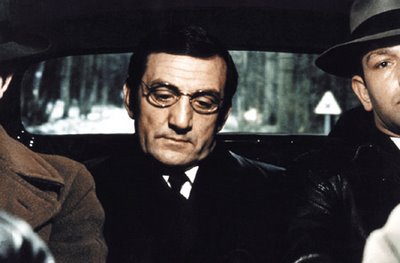Dan Callahan: Tender is the Night

There were several things to get excited about in 2006. First and foremost was the US premiere of Jean-Pierre Melville’s Army of Shadows (1969), an epic meditation on the French resistance that dwarfs Melville’s smaller noirs. Robert Altman made a graceful final bow with the death-obsessed but elegiac A Prairie Home Companion, and David Lynch crafted a three-hour love letter to Laura Dern, INLAND EMPIRE, that features his most loving and sympathetic views of women caught in traps. Cristi Puiu’s The Death of Mr. Lazarescu made the movies feel like life again, with its real time study of a man heading towards the grave without much comfort along the way. And Emma Thompson spearheaded a charming and rather overlooked children’s film, Nanny McPhee, that captured some of the spirit of the old 1950’s Ealing comedies. A fleeting moment that has stayed with me: the way Vanessa Redgrave says, “You will burn, Maurice,” to Peter O’Toole in Venus, her voice filled with vengeful, “I’m going too far, but so what?” certainty. And two glories from the difficult but rewarding Jacques Rivette/Roberto Rossellini retros at MOMI and MOMA: the dreamy views of solitude in Rivette’s Out 1: Spectre (1972), and Ingrid Bergman’s lyric performance in the almost-never-seen, trance-like, valedictory Joan of Arc at the Stake (1954)
On a more depressing note, a film like Little Miss Sunshine became an “indie” hit; in the 1970’s, Little Miss Sunshine would have starred Ryan O’Neal and Jill Clayburgh and it would have been viewed as a completely artificial, commercial comedy. Today, it’s an “independent” movie because it didn’t cost too much money. Worse, though, to my mind, is the contemptuous Little Children, which got a bewildering number of critical raves for hating all of its characters and parroting arid old New Yorker short stories while adding a Dateline “To Catch a Predator” modern twist. Aside from the oases provided by tough-love Altman and romantic Lynch, 2006 was a year in film where contempt was in, from I Hate My Mother (the egregious Running With Scissors) to I Hate America (Babel). We even saw a revival of the Predatory Repressed Lesbian character (a syllable-munching Dame Judi Dench in Notes on a Scandal) that I thought had been retired since 1968. If I was to wish for anything in the coming year, it would be a little tenderness and some gentle understanding in our films. We’ve all had enough, I think, of fire hose theatrics and mean-spirited, hollow mockery.
_________________________________________________
Dan Callahan is a contributor to The House Next Door. His writing has appeared in Slant Magazine, Bright Lights Film Journal, and Senses of Cinema among other publications.

3 Comments:
Dan,
Your paragraph that begins "On a more depressing note..." is a brutal rundown of what's been wrong with the whole indiewood movement (economic trend) of recent years: Despite prestige marketing, it is mostly small and cheap, and I'm not talking about the budgets.
Thanks for the love, Dan, and right back at ya. Been checking in on your work at Slant, Time Out, etc. ever since you left us crying at Showbiz.
For those who don't know, check this guy out:
http://www.brightlightsfilm.com/callahan.htm
Dan:
I haven't yet seen Little Children or Running with Scissors, and I think it's unfairly reductive to label Babel (which personally I admire on the level of an ambitious failure) as simply an "I Hate America" screed (if I find some merit in what it suggests about American imperialism, does that make me anti-American? Boy, I hope not!)
Still, I thank you for your second paragraph, because the kind of contempt you say you felt in many movies this year is an issue that's been eating away at me as a filmgoer all year long. Even in some movies I enjoy, I always struggle with my reactions when I realize that it's quite possible I enjoyed something because of how superior it made me feel towards the characters and behavior onscreen. As a relatively well-off, fairly sophisticated, comfortably middle-class college student, it's easy for me to laugh at, say, the Midwesterner in Borat who says a hateful comment about gays, thinking, "Oh, I wouldn't say that!" It's arguably less easy, and more challenging, to laugh at that same person if you actually are made to understand the environment which shaped his worldview---but, of course, that's outside of Sacha Baron Cohen's aims.
Unfortunately, that seemed to be outside the aim of a lot of filmmakers, independent or mainstream, this year. For every humanist achievement like the Dardenne brothers' L'Enfant---a film that clearly didn't approve of its lead character's morally troublesome actions, but which at least seemed to care deeply about what happened to him, concerned about whether he could achieve a level of personal redemption---you had to endure the overrated sitcom antics of a movie like Little Miss Sunshine, which, in spite of great performances all around, seems to sacrifice credible human behavior simply for the sake of its satire and its Sundance-approved quirkiness (maybe this is just me, but does anyone else find the level of condescension toward certain minor characters---the seemingly insensitive "bereavement liaison," the cop who lets the Hoovers go on account of Grandpa's porn, the beauty contestant parents---disturbing enough that it sours you from the rest of the movie?)
But of course, maybe I'm just too sheltered-in-suburbia to be able to take the supposed "harsh truth" of films like Little Children or Little Miss Sunshine...?
<< Home